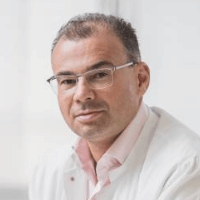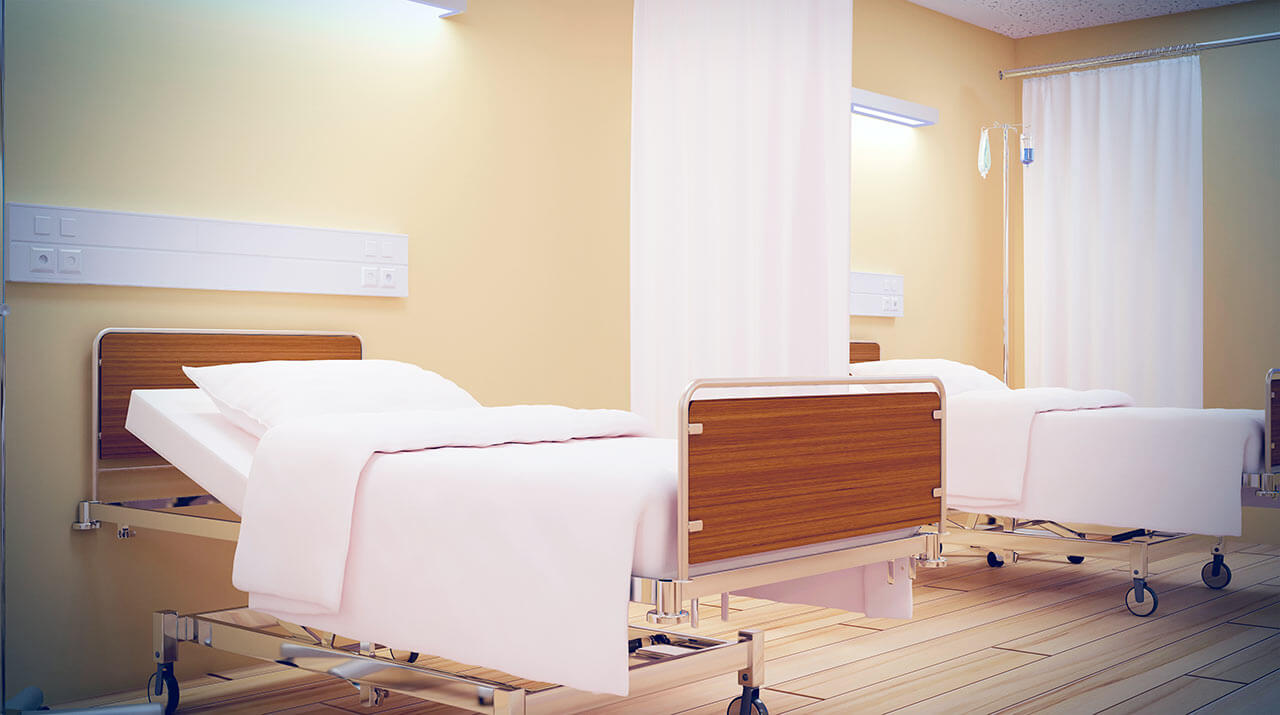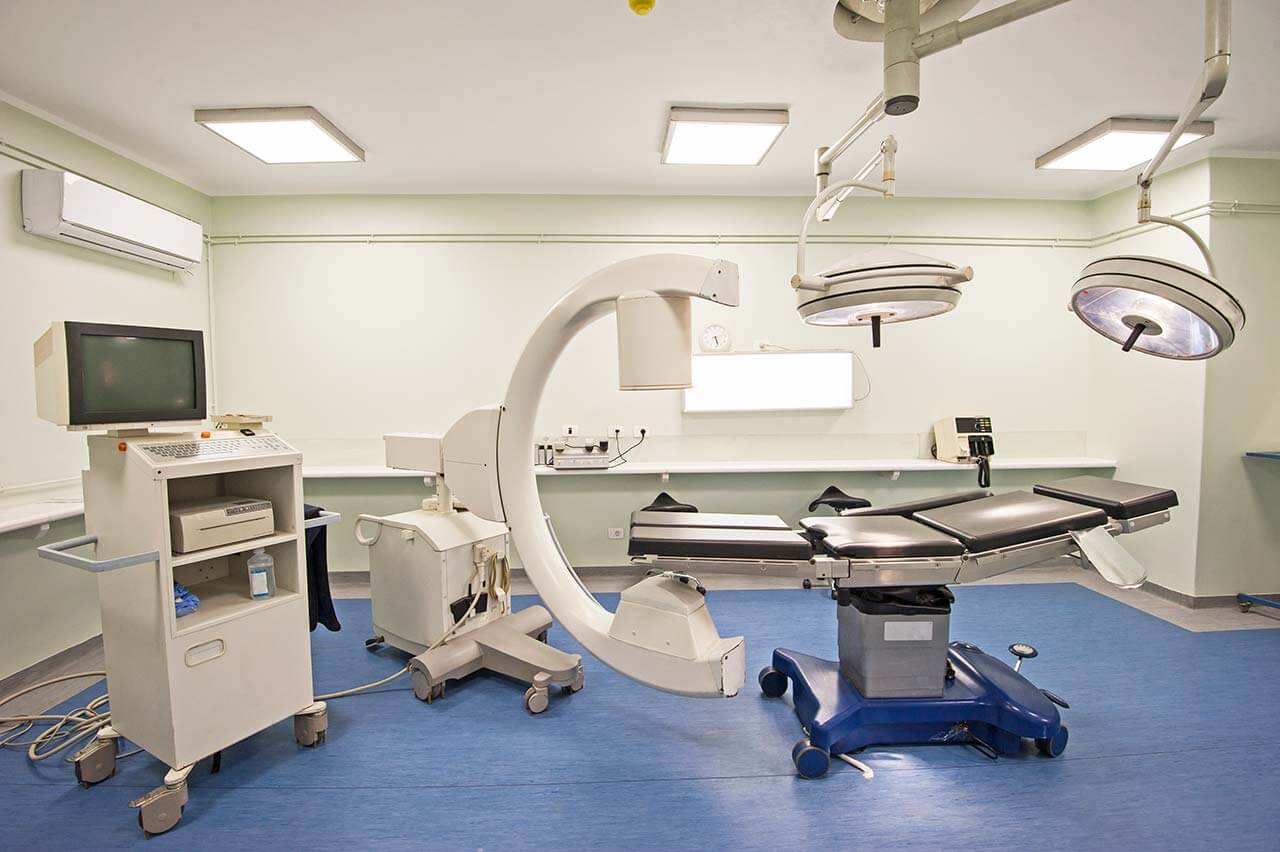
The program includes:
- Initial presentation in the clinic
- clinical history taking
- physical examination
- laboratory tests:
- complete blood count
- general urine analysis
- biochemical analysis of blood
- hormone tests
- indicators of inflammation
- indicators blood coagulation
- ultrasound of genital system
- preoperative care
- surgery phalloplastik
- symptomatic treatment
- control examinations
- consultation of related specialists
- the cost of essential medicines and materials
- nursing services
- explanation of future recommendations
Required documents
- Medical records
Service
You may also book:
 BookingHealth Price from:
BookingHealth Price from:
About the department
The Department of Urology and Phalloplasty Surgery at the German Centre for Urology and Phalloplasty Surgery Darmstadt offers modern methods of surgical interventions to improve the functions and aesthetic appearance of the male genital organs, in particular the penis. The specialization includes penis enlargement surgery, surgery to treat Peyronie’s disease, congenital penile curvature and penile prosthetics. The surgical procedures are performed with the participation of specialized urologists and plastic surgeons, which helps to achieve the best result. The surgeons annually perform about 2,500 surgical procedures in their areas of specialization in state-of-the-art operating rooms of the department, which gives the medical facility a unique status in its field of competence.
The department is headed by Dr. med. Christoph Jethon. According to the reputable Focus magazine, the expert ranks among the top plastic and aesthetic surgeons in Germany!
The first priority of the department is penis enlargement surgery. The department has performed than 7,000 such interventions for its long clinical practice. The results of the department are breaking records at the world level –the length of the penis can be enlarged by 3-6 cm, the penile girth enhancement can reach 3 cm, whereas the glans penis can be enlarged by 30-50%. To achieve such successful results, the department uses the very latest surgical techniques that have minimal risks and do not lead to scar formation. The operations are performed on an outpatient basis.
The department also has unique competencies in the treatment of Peyronie's disease (pathological curvature of the penis during erection). The surgeons of the department offer special microsurgical interventions that help to effectively get rid of the pathology. The surgery to treat Peyronie's disease does not affect the size of the penis. The department is the Center of Excellence and the Reference Center for Reconstructive Surgery for Peyronie's Disease. The surgeons of the department have vast experience in this field, including the treatment of particularly complex cases of penile curvature. The success of therapy exceeds 90%. In addition, the department performs operations to correct penile curvature that are not related to Peyronie's disease.
The main areas of clinical practice also include penile prosthetics (status of the Center of Excellence). The surgeons perform sparing prosthetic surgeries, which contribute to rapid postoperative recovery and minimal pain. In many cases, such operations are performed on an outpatient basis. The high level of patient satisfaction with the treatment results is confirmed by the outstanding professionalism of the department’s specialists.
The department’s range of medical services includes:
- Penis enlargement surgery. The male penis consists of the external and internal sections. The ratio between their sizes is approximately 50:50. The penis enlargement procedure involves a small incision of approximately 3 cm in the pubic hair region. When performing the intervention, the surgeon structurally transforms the front ligaments of the penis (the posterior ligaments are not involved in the operation). With the patient’s own tissues, the surgeons form a new anchor point for the external section of the penis at the site of actual lengthening. In this case, there are used unique suture techniques and materials specially developed by the experts of the department (surgeons do not use synthetic materials, such as silicone). Thus, by straightening the internal section of the penis, the surgeons manage to achieve lengthening of its external section. In fact, the operation changes the size ratio of the internal and external sections of the penis, due to which it lengthens. The surgical procedure does not involve manipulations on the root of the penis, in the area of which the urethra, large blood vessels and nerve endings pass. The use of special materials and modified suturing techniques ensures the formation of small scars, while the lack of incisions in the penis itself allows to avoid the risks of developing functional disorders. The patient’s skin covering the penis and scrotum is enough to cover the enlarged part of the penis, so there is no need for transplantation of additional skin.
- Penis girth enlargement surgery. This surgical intervention is performed by transplanting the patient's autologous adipose tissue into the penis. This type of surgery is one of the most complex interventions to enlarge size of the penis, since many aspects should be taken into account to ensure good long-term results. For example, the effect of the usual sampling of adipose tissue with its subsequent injection under the skin of the penis lasts no more than 6 months. Therefore, to achieve long-term results, the use of special techniques developed by the department’s specialists is required. The first step of the procedure is the sampling of adipose tissue from the hip area. Its injection into the penis is preceded by the carefully processing and cleaning of the obtained material. The adipose tissue processing ensures its uniform distribution under the skin of the penis. To achieve a successful result, the patient should wear a specially designed bandage with a controlled level of compression within a week after surgery. This operation is often performed in combination with an penile lengthening surgery.
- Glans penis enlargement surgery. To enlarge the glans penis, the doctors inject under the skin a specially developed high-quality natural material, which will be gradually replaced by the patient’s own tissue. The procedure is performed using a unique technique that does not leave scars. This technique helps to significantly enlarge the size of the glans penis and maintain its natural shape. In addition, the sensitivity of nerve endings and the risk of premature ejaculation are reduced.
- Surgery to treat Peyronie's disease. The surgical procedure involves the removal of fibrous plaques from the protein membrane of the penis with its subsequent reconstruction. When performing the procedure, the surgeon makes a circular incision below the coronal sulcus and displaces the skin from the penis to the abdomen, leaving almost no visible scar. To clearly imagine penile structures, the doctors use microsurgical techniques. Thus, the surgeon can see in detail the cavernous body and the protein membrane,thereby detecting all fibrous plaques. With microsurgical techniques, the specialist removes fibrous plaques, as well as the secondary scar tissue surrounding them. The procedure is followed by the reconstruction of the affected areas of the cavernous body using natural biodegradable materials (usually a high-quality collagen fleece). For this purpose, the doctors used to apply autologous tissues, such as venous grafts or sections of the oral mucosa. However, the use of these tissues is more traumatic for the patient and has several disadvantages. In this regard, the department has been using collagen fleece for more than 10 years. Collagen is a natural protein that forms the basis of connective tissue in the body. The body uses it as a building material, like bricks for building a house. Collagen fleece is fully integrated into the tissue of the penis, due to which the patient has no visible scars. In addition, the surgical scar is less visible due to its location near the coronal sulcus. In some patients, surgery to treat Peyronie's disease is combined with circumcision. This is necessary in cases where the foreskin becomes denser or narrows due to Peyronie's disease. This surgical technique is highly complicated, but the rich experience of the surgeons in the department allows them to achieve a favorable outcome for the operation.
- Surgery to correct congenital curvature of the penis. The surgical procedure involves the surgical reconstruction of the affected areas of the cavernous body using natural materials (usually high-quality collagen fleece is used). The patient does not have visible scars on the penis after the intervention. The scar is located in the same place as the circumcision scar, so it is not noticeable. In rare cases, the surgery to correct the congenital curvature of the penis is performed simultaneously with circumcision, for example, in case of a significant foreskin narrowing. The surgeons of the department have been performing such interventions for more than 15 years, and therefore they guarantee excellent results even in especially complex clinical cases.
- Penile prosthetics. Based on the results of many years of clinical practice, when performing penile prosthetics, the specialists of the department prefer the use of hydraulic penile implants. They are the only type of implant that can optimally simulate the natural erection and still remain invisible externally. An additional result of installing this type of implant is a visual enlargement of the penis. In this case, in contrast to the use of solid implants, the penis has a natural appearance. The department usually uses implants from the 700 series manufactured by AMS. According to the extensive experience of the department’s surgeons, these devices provide the best functional results and can be considered the "gold standard" of treatment. In most cases, penile prosthetics is performed on an outpatient basis, under general anesthesia. All parts of the device are inserted through a small skin incision between the penis and scrotum using endoscopic instruments. After suturing, the incision heals quickly and leaves a virtually invisible scar. Within 3-4 days after surgery, the patient is recommended to spend most of the time lying or sitting. Also, to achieve the best functioning of the implant, the patient should refrain from playing sports and sexual activity within 5 weeks. There are will be no other restrictions later.
- Other surgical treatments
Curriculum vitae
Education and Professional Career
- Study of Medicine at Johann Wolfgang Goethe University Frankfurt am Main.
- Institute of Medical Virology, University Hospital Frankfurt am Main.
- Institute of Anesthesiology, Darmstadt Clinic.
- Internal Medicine, Main-Taunus Clinic, Bad Soden.
- Department of Plastic Surgery, Catholic Clinic Ruhrhalbinsel, Essen.
- Plastic Surgery Clinic Lampe and Wolters, Frankfurt.
- Department of Plastic, Reconstructive and Hand Surgery, Main-Taunus Clinic, Hofheim.
- Board Certification in Plastic Surgery, State Chamber of Physicians of Frankfurt am Main.
Honors
- 2009 Certificate of Honor from the Network for Urogenital Reconstructive Surgery (UGRS).
- According to the reputable Focus magazine, the doctor ranks among the top plastic and aesthetic surgeons in Germany.
Photo of the doctor: (c) Deutsche Zentrum für Urologie und Phalloplastische Chirurgie
About hospital
The German Centre for Urology and Phalloplasty Surgery Darmstadt is an advanced highly specialized medical facility, which provides patients with highly competent medical care of outstanding quality. The center is part of the International Network for Urogenital Reconstructive Surgery(UGRS) located in Germany and Spain. The surgeons of this network follow uniform standards, and also regularly have rotations in the centers that are members of this network. The specialists have performed more than 30,000 operations over their entire clinical practice, which helped to restore men's health to patients and thereby ensure a decent quality of life.
The center in Darmstadt is proud of its long tradition and outstanding success in penile surgery. The medical institution is one of the few in Europe and around the world, which has been accumulating experience in highly specialized surgical interventions over the years. Such operations are often not available in conventional Urologic Clinics, which mostly focus on the treatment of life-threatening and chronic urologic pathologies, but not on the correction of the size or shape of the penis. The success of the center’s clinical practice is confirmed by the ever-growing number of patients who come to Germany even from such distant and developed countries as Japan and Australia.
In addition to high-tech medical infrastructure, the center offers patients the services of the best specialists in the field of urogenital reconstructive surgery. A prerequisite for the treatment of each patient is the participation in the therapeutic process of the chief surgeon of the center. Certainly, patients receive care not only from surgeons, but also from a large number of assistant doctors, nurses, attendants, etc.
Due attention is paid to patient counseling. On average, a consultation lasts about an hour. During the consultations, the patient receives detailed information on the course of the surgical intervention and recommendations for care in the postoperative period.
Thus, the center has all the necessary competencies to achieve an excellent treatment result for sensitive urological problems. A pleasant bonus for the patient will be a calm and friendly atmosphere, compassionate care and understanding of his needs and wishes.
Photo: (c) depositphotos
Accommodation in hospital
Patients rooms
The patients of the German Centre for Urology and Phalloplasty Surgery Darmstadt live in comfortable patient rooms made in modern design. The room is equipped with an ensuite bathroom with shower and toilet, as well as with everything necessary for a comfortable stay in the clinic during treatment. The windows of the patient rooms in the center offer the views of the beautiful cityscapes of Darmstadt and the Artists' Colony in Mathildenhöhe.
Meals and Menus
The patients of the center are offered healthy and tasty three meals a day: breakfast, lunch and dinner. If for some reason you do not eat all foods, you will be offered an individual menu.
Further details
Standard rooms include:




